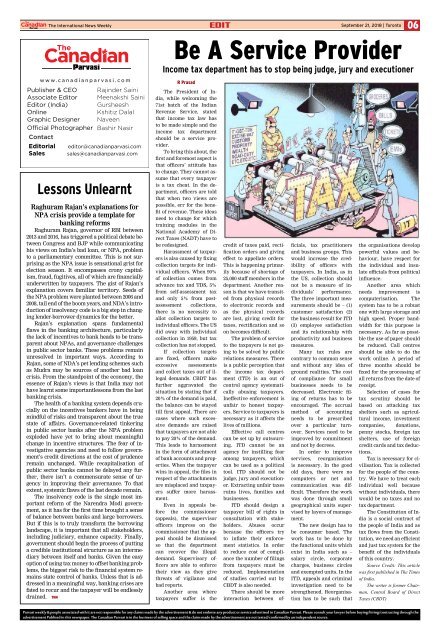The Canadian Parvasi- Issue 62
Create successful ePaper yourself
Turn your PDF publications into a flip-book with our unique Google optimized e-Paper software.
<strong>The</strong> International News Weekly Edit<br />
06<br />
September 21, 2018 | Toronto<br />
<strong>The</strong><br />
Be A Service Provider<br />
Income tax department has to stop being judge, jury and executioner<br />
w w w . canadianparv asi. c o m<br />
Publisher & CEO<br />
Associate Editor<br />
Editor (India)<br />
Online<br />
Graphic Designer<br />
Official Photographer<br />
Contact<br />
Editorial<br />
Sales<br />
Rajinder Saini<br />
Meenakshi Saini<br />
Gursheesh<br />
Kshitiz Dalal<br />
Naveen<br />
Bashir Nasir<br />
editor@canadianparvasi.com<br />
sales@canadianparvasi.com<br />
Lessons Unlearnt<br />
Raghuram Rajan’s explanations for<br />
NPA crisis provide a template for<br />
banking reforms<br />
Raghuram Rajan, governor of RBI between<br />
2013 and 2016, has triggered a political debate between<br />
Congress and BJP while communicating<br />
his views on India’s bad loan, or NPA, problem<br />
to a parliamentary committee. This is not surprising<br />
as the NPA issue is sensational grist for<br />
election season. It encompasses crony capitalism,<br />
fraud, fugitives, all of which are financially<br />
underwritten by taxpayers. <strong>The</strong> gist of Rajan’s<br />
explanation covers familiar territory. Seeds of<br />
the NPA problem were planted between 2006 and<br />
2008, tail end of the boom years, and NDA’s introduction<br />
of insolvency code is a big step in changing<br />
lender-borrower dynamics for the better.<br />
Rajan’s explanation spans fundamental<br />
flaws in the banking architecture, particularly<br />
the lack of incentives to bank heads to be transparent<br />
about NPAs, and governance challenges<br />
in public sector banks. <strong>The</strong>se problems remain<br />
unresolved in important ways. According to<br />
Rajan, some of NDA’s pet lending schemes such<br />
as Mudra may be sources of another bad loan<br />
crisis. From the standpoint of the economy, the<br />
essence of Rajan’s views is that India may not<br />
have learnt some importantlessons from the last<br />
banking crisis.<br />
<strong>The</strong> health of a banking system depends crucially<br />
on the incentives bankers have in being<br />
mindful of risks and transparent about the true<br />
state of affairs. Governance-related tinkering<br />
in public sector banks after the NPA problem<br />
exploded have yet to bring about meaningful<br />
change in incentive structures. <strong>The</strong> fear of investigative<br />
agencies and need to follow government’s<br />
credit directions at the cost of prudence<br />
remain unchanged. While recapitalisation of<br />
public sector banks cannot be delayed any further,<br />
there isn’t a commensurate sense of urgency<br />
in improving their governance. To that<br />
extent, systemic flaws of the last decade remain.<br />
<strong>The</strong> insolvency code is the single most important<br />
reform of the Narendra Modi government,<br />
as it has for the first time brought a sense<br />
of balance between banks and large borrowers.<br />
But if this is to truly transform the borrowing<br />
landscape, it is important that all stakeholders,<br />
including judiciary, enhance capacity. Finally,<br />
government should begin the process of putting<br />
a credible institutional structure as an intermediary<br />
between itself and banks. Given the easy<br />
option of using tax money to offset banking problems,<br />
the biggest risk to the financial system remains<br />
state control of banks. Unless that is addressed<br />
in a meaningful way, banking crises are<br />
fated to recur and the taxpayer will be endlessly<br />
drained. TNN<br />
R Prasad<br />
<strong>The</strong> President of India,<br />
while welcoming the<br />
71st batch of the Indian<br />
Revenue Service, stated<br />
that income tax law has<br />
to be made simple and the<br />
income tax department<br />
should be a service provider.<br />
To bring this about, the<br />
first and foremost aspect is<br />
that officers’ attitude has<br />
to change. <strong>The</strong>y cannot assume<br />
that every taxpayer<br />
is a tax cheat. In the department,<br />
officers are told<br />
that when two views are<br />
possible, err for the benefit<br />
of revenue. <strong>The</strong>se ideas<br />
need to change for which<br />
training modules in the<br />
National Academy of Direct<br />
Taxes (NADT) have to<br />
be redesigned.<br />
Harassment of taxpayers<br />
is also caused by fixing<br />
collection targets for individual<br />
officers. When 90%<br />
of collection comes from<br />
advance tax and TDS, 5%<br />
from self-assessment tax<br />
and only 5% from postassessment<br />
collections,<br />
there is no necessity to<br />
allot collection targets to<br />
individual officers. <strong>The</strong> US<br />
did away with individual<br />
collection in 1959, but tax<br />
collection has not stopped.<br />
If collection targets<br />
are fixed, officers make<br />
excessive assessments<br />
and collect taxes out of illegal<br />
demands. CBDT has<br />
further aggravated the<br />
situation by stating that if<br />
20% of the demand is paid,<br />
the balance can be stayed<br />
till first appeal. <strong>The</strong>re are<br />
cases where such excessive<br />
demands are raised<br />
that taxpayers are not able<br />
to pay 20% of the demand.<br />
This leads to harassment<br />
in the form of attachment<br />
of bank accounts and properties.<br />
When the taxpayer<br />
wins in appeal, the files in<br />
respect of the attachments<br />
are misplaced and taxpayers<br />
suffer more harassment.<br />
Even in appeals before<br />
the commissioner<br />
(appeals), the supervisor<br />
officers impress on the<br />
commissioner that the appeal<br />
should be dismissed<br />
so that the department<br />
can recover the illegal<br />
demand. Supervisory officers<br />
are able to enforce<br />
their view as they give<br />
threats of vigilance and<br />
bad reports.<br />
Another area where<br />
taxpayers suffer is the<br />
credit of taxes paid, rectification<br />
orders and giving<br />
effect to appellate orders.<br />
This is happening primarily<br />
because of shortage of<br />
25,000 staff members in the<br />
department. Another reason<br />
is that we have transited<br />
from physical records<br />
to electronic records and<br />
as the physical records<br />
are lost, giving credit for<br />
taxes, rectification and so<br />
on becomes difficult.<br />
<strong>The</strong> problem of service<br />
to the taxpayers is not going<br />
to be solved by public<br />
relations measures. <strong>The</strong>re<br />
is a public perception that<br />
the income tax department<br />
(ITD) is an out of<br />
control agency systematically<br />
abusing taxpayers.<br />
Ineffective enforcement is<br />
unfair to honest taxpayers.<br />
Service to taxpayers is<br />
necessary as it affects the<br />
lives of millions.<br />
Effective call centres<br />
can be set up by outsourcing.<br />
ITD cannot be an<br />
agency for instilling fear<br />
among taxpayers, which<br />
can be used as a political<br />
tool. ITD should not be<br />
judge, jury and executioner.<br />
Extracting unfair taxes<br />
ruins lives, families and<br />
businesses.<br />
ITD should design a<br />
taxpayer bill of rights in<br />
consultation with stakeholders.<br />
Abuses occur<br />
because the officers try<br />
to inflate their enforcement<br />
statistics. In order<br />
to reduce cost of compliance<br />
the number of filings<br />
from taxpayers must be<br />
reduced. Implementation<br />
of studies carried out by<br />
CBDT is also needed.<br />
<strong>The</strong>re should be more<br />
interaction between officials,<br />
tax practitioners<br />
and business groups. This<br />
would increase the credibility<br />
of officers with<br />
taxpayers. In India, as in<br />
the US, collection should<br />
not be a measure of individuals’<br />
performance.<br />
<strong>The</strong> three important measurements<br />
should be – (1)<br />
customer satisfaction (2)<br />
the business result for ITD<br />
(3) employee satisfaction<br />
and its relationship with<br />
productivity and business<br />
measures.<br />
Many tax rules are<br />
contrary to common sense<br />
and without any idea of<br />
ground realities. <strong>The</strong> cost<br />
of compliance for small<br />
businesses needs to be<br />
decreased. Electronic filing<br />
of returns has to be<br />
encouraged. <strong>The</strong> accrual<br />
method of accounting<br />
needs to be prescribed<br />
over a particular turnover.<br />
Services need to be<br />
improved by commitment<br />
and not by decrees.<br />
In order to improve<br />
services, reorganisation<br />
is necessary. In the good<br />
old days, there were no<br />
computers or net and<br />
communication was difficult.<br />
<strong>The</strong>refore the work<br />
was done through small<br />
geographical units supervised<br />
by layers of management.<br />
<strong>The</strong> new design has to<br />
be consumer based. <strong>The</strong><br />
work has to be done by<br />
the functional units which<br />
exist in India such as –<br />
salary circle, corporate<br />
charges, business circles<br />
and exempted units. In the<br />
ITD, appeals and criminal<br />
investigation need to be<br />
strengthened. Reorganisation<br />
has to be such that<br />
the organisations develop<br />
powerful values and behaviour,<br />
have respect for<br />
the individual and insulate<br />
officials from political<br />
influence.<br />
Another area which<br />
needs improvement is<br />
computerisation. <strong>The</strong><br />
system has to be a robust<br />
one with large storage and<br />
high speed. Proper bandwidth<br />
for this purpose is<br />
necessary. As far as possible<br />
the use of paper should<br />
be reduced. Call centres<br />
should be able to do the<br />
work online. A period of<br />
three months should be<br />
fixed for the processing of<br />
all returns from the date of<br />
receipt.<br />
Selection of cases for<br />
tax scrutiny should be<br />
based on attacking tax<br />
shelters such as agricultural<br />
income, investment<br />
companies, donations,<br />
penny stocks, foreign tax<br />
shelters, use of foreign<br />
credit cards and tax deductions.<br />
Tax is necessary for civilisation.<br />
Tax is collected<br />
for the people of the country.<br />
We have to treat each<br />
individual well because<br />
without individuals, there<br />
would be no taxes and no<br />
tax department.<br />
<strong>The</strong> Constitution of India<br />
is a social contract of<br />
the people of India and as<br />
tax flows from the Constitution,<br />
we need an efficient<br />
and just tax system for the<br />
benefit of the individuals<br />
of this country.<br />
Source Credit: This article<br />
was first published in <strong>The</strong> Times<br />
of India.<br />
<strong>The</strong> writer is former Chairman,<br />
Central Board of Direct<br />
Taxes (CBDT)<br />
<strong>Parvasi</strong> weekly & people associated with it are not responsible for any claims made by the advertisement & do not endorse any product or service advertised in <strong>Canadian</strong> <strong>Parvasi</strong>. Please consult your lawyer before buying/hiring/contracting through the<br />
advertisement Publised in this newspaper. <strong>The</strong> <strong>Canadian</strong> <strong>Parvasi</strong> is in the business of selling space and the clains made by the advertisement are not tested/confirmed by an independent source.

















